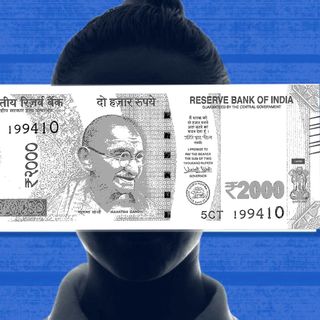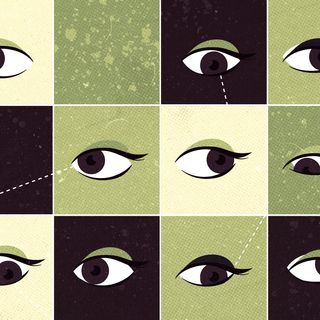
The First Time People Experienced Sexism, and Their (Imagined) Responses
From observing who serves whom at dinner, to being plagued by relatives’ whispered judgments, most initiations into sexism start at home.

I grew up in a household with all women, and sexism wasn’t an everyday reality for me until much later in life. When I graduated high school, I was taken to my family members’ houses where they grilled me about my career choices. One provocative grand-uncle, who until then had often pinched my arms under the pretext of affection, started berating my choice to become a journalist. I remember him being flabbergasted at why I wasn’t becoming a doctor, like my mother. I sat there, quietly, as his voice slowly got louder, until he started proclaiming I’d have to sleep with people to become a reputed journalist. “Are you ready to sleep with someone? Will you sleep with your boss? Will you?” he asked, incessantly, as 16-year-old me sat there stunned, thinking the man had completely lost it.
That’s the first time I experienced sexism that I identified as such (worse, albeit scattered, instances had happened when I was a child that I could only term as sexism in retrospect). And unfortunately, my grand-uncle’s rage at a hypothetical scenario of me sleeping my way to the top wasn’t even as egregious as other, more dangerous forms sexism can take. I was lucky to have a mother who stood up to him, and who has supported me since.
Sexism manifests in a variety of ways, at almost every milestone in life, more often and intensely for queer people and cishet women, than for cishet men.
But the concept of discriminating against someone on the basis of their sex or gender affects everyone — fueled by a patriarchal mindset and manifested into reality by misogyny, sexism against men often translates to a restriction on their gender expression and entrenched toxic masculinity, whereas for other genders, it often culminates into an ever-present threat of assault and harassment. The Swaddle asked people about the first time they recognized sexism, and how they responded, or how they wished they had responded — to demonstrate how pervasive sexism is, and all the ways in which it pervades into most of our lives.
*
Shreya, 18, found out about sexism when her younger brother was born. Now 9 years old, her brother was always treated with love and attention; their parents made “a lot of efforts running behind my brother from feeding him to … combing [his hair], dressing him up and polishing his shoes.” At that same age, Shreya says she was “taught to cook, knead dough, make potato fry curry … because that’s what girls are ‘supposed to know and learn voluntarily’ — but they don’t teach it to my brother.” At age 13, Shreya realized she “was supposed to learn it all at a young age. While it’s all right for [my brother] not to know things for some reason.”
She often tells her family raising her and her brother differently is unfair, but she says her parents believe in gendered roles and expressions. They often chide her brother when he gets frightened of bees, and tell him not to act like a girl, she says. “That’s the attitude; that’s what they are passing on to him, and they don’t know it’s wrong. And I correct them as much as I can. But there’s no help, except adjusting or doing [my own] thing, when our own people are like this.”
*
Divya Iyer’s first experience with sexism happened when she was 10 years old. She was at her aunt and uncle’s home when she saw her uncle wash his hands on his food plate, which filled with dirty water; she then watched her aunt dutifully remove the plate from under him. “I felt bad for my aunt. I understand my uncle is a busy man, but can’t he get up and wash his hands in the basin? My aunt is rich but kind of a caged bird. I vowed never to be like that,” Iyer said.
Related on The Swaddle:
The Difference Between Sexism and Misogyny, and Why it Matters
“I won’t say anything, because he will never understand. What I saw was just the beginning; he had different rules for my cousins. The female wasn’t allowed to wear Western clothes, no co-education colleges [for his kids]. The male was given more freedom. [He] once told me a girl’s place is in the kitchen, and the whole family laughed at it; I was so angry!” Iyer said. “I don’t meet him because I can’t handle this. But characters like [him] made me self-dependent and bold.”
*
F.J. was 3 years old when she first heard her drunk uncles mention in a casual conversation that her father would have rather had a boy. As a child, she had only blue things, and her father often called her by his own name, she said. Up until her 20s, F.J. said she did not feel feminine or beautiful; it was only in therapy that she brought this up and started healing.
“I come from an orthodox and patriarchal religious family but I’ve made my peace with them. Now I am doing my higher studies in gender, show no signs of getting married at 29 and don’t go to church. They’ve, in a sense, made peace with my life choices as well,” she said. “Now I have the vocabulary to deconstruct gender politics for them. And I do. Just not directly pointing to their mistakes.”
*
When K.J. was 4, she says she overheard her parents and grandparents having a conversation contemplating whether they should raise her in a traditional or a modern way. While they decided on the latter, K.J. says, it was a smokescreen: “I was brought up in a home where my obedience was [more] important than my life, and I had to fear my elders in order to show my respect. … My mom always thought that because I was a girl I would be easier to raise and that I wouldn’t give her much trouble as opposed to my brother.” K.J. says she suffers from borderline personality disorder, which her parents failed to recognize since they thought it was normal for her as a girl to undergo “mood swings.”
“I do little things to prove them wrong, like excel in activities I take up; I refuse to be silent in family gatherings and meetings; I try and do all the things they don’t want a girl to [do], even if I don’t like them, just so I can prove [to] them that girls are meant to be heard,” K.J. said. “If I could talk to them, I don’t know what I would say and I don’t want to think about it because I am still trying to find a reason to unconditionally love my family and not have a childhood full of unspoken words.”
*
S.D., 48, was 18 years old when she found out her uncle and aunt had been spreading lies about her sexual life to her parents. “They had told my parents that I was going to hotel rooms with guys to have sex. They had told my parents — not that they thought or had heard, but that they knew — that I was being a slut and having sex with many, many guys.” In her first year of college, S.D. said, she was naive and couldn’t even imagine having sex with anybody. And her parents, who knew this about her, silently listened to the aunt and uncle and came back home with fallen faces.
Related on The Swaddle:
Joke or Sexism? Misogynist Humor Condones Prejudice
“Back then, I couldn’t muster up the courage to ask them, ‘Why didn’t you defend me?’ It’s only as an afterthought that I realized I should have,” S.D. said. “I’m their own daughter. How can they hear shitty things about me and come back? That opened the path for further comments from others also. I started feeling that I’m undermined by so many people around me. They crushed my confidence all the time.”
It was only after S.D.’s divorce at the age of 32 that she finally started outgrowing the childhood bullying of her extended family. Now, looking back, she says, “I would have fought. If I was confident enough, I would have called them out. I would have gone straight to my aunt and uncle’s place and told them how dare you say things about me? Why? What are the sources? And how dare you say anything in front of my parents?”
The problem, S.D. says, is “Women are not taught to fight. We are taught to be approved by everyone. So, if you are not approved by someone, that means there’s a problem with you, not them. So, rather than confronting them or calling them out, we try to find mistakes inside ourselves like ‘Where am I lacking?’ ‘Where do I need to amend myself?'”
*
“At 17, I remember being sexually assaulted and being blamed for the same … in my home. So that’s when I first learned about sexism,” Muskan, 20, said. “When I told my father about the incident, he just didn’t do anything, and then my other family members along with my father blamed me for the way I dress and [said] that [the assaulter] is a guy [which means he] just lost senses for a while, apparently.”
Related on The Swaddle:
Good Manners Often Mask Sexism — And They’re Restricting Women’s Agency
Muskan, now 20, says the man who abused her still visits her home and is shown respect by everyone, while she has been told by her father she needs to “forgive and forget. … I was expected to shut my mouth for society and familial reputation because I am a girl and can’t talk about it, while he can still go doing anything.” She adds, “As a fault on my part I … didn’t do anything about it. I do regret it.”
At the time, Muskan had only told her mother, who she said supported her privately. But Muskan wishes she hadn’t told her father anything. “I wish that I could just take that moment back and he never knew about this. Because when you get these reactions from such a person of importance, you lose love easily.”
*
Raghuram, 29, who says he was fat as a kid, was often compared to girls growing up. “I once had an older student slap [me] on chest and comment that I had breasts like a woman. My arms were soft, too — that led to comparison to a woman’s arm.” The bullying, which Raghuram said happened when he was 13, led him to be conscious of his body for most of his life.
“I feel it was sexist because I was made to feel ashamed for not fitting the bill for being a ‘normal’ man. If I didn’t live up to these norms I was somehow inferior, and it was implied that women were inferior because there is something to be ashamed of, for having breasts and for not having bulging biceps,” Raghuram said. “I wish I could have said that not everybody is the same. Just because someone doesn’t fit into a normal body type doesn’t mean they can be made to feel inferior.”
*
Sharan Sanil loved to play with dolls as a child. When he was around 5 to 7 years old, he remembers being questioned and chided for playing with “girls’ toys.” “I did have an idea that if I was a girl, I wouldn’t have been asked those questions, and this felt unfair to me,” Sanil says. “I just didn’t think there was anything inherently wrong in what I was doing. I remember being told that ‘those toys are for girls,’ and when I asked why, I was simply dismissed instead of given an actual answer — this is what irked me the most.”
*
Anubhav was 13 when he came out to a friend as gay — “and suddenly the whole class started calling me names. Everyone started behaving very differently. Guys didn’t want to be around me and requested the teachers to make me sit with the girls. The girls weren’t kind either,” the now 21-year-old said. “There’s no one you can ask for help. So, there’s absolutely no way to respond.”
Even now, Anubhav says he’d rather be quiet. “It’s a very passive approach, but I think avoiding filth is better than engaging with it. The problem with our society is that even the most celebrated people are extremely short on morals. Sexism and homophobia has been promoted a lot by individuals with great influence on the society. So instead of saying something to someone in particular, I’d like to work towards generating awareness among the masses.”
Rajvi Desai is The Swaddle's Culture Editor. After graduating from NYU as a Journalism and Politics major, she covered breaking news and politics in New York City, and dabbled in design and entertainment journalism. Back in the homeland, she's interested in tackling beauty, sports, politics and human rights in her gender-focused writing, while also co-managing The Swaddle Team's podcast, Respectfully Disagree.
Related


Is This Normal? “I Don’t Know Where to Look When I’m Talking to Someone”
